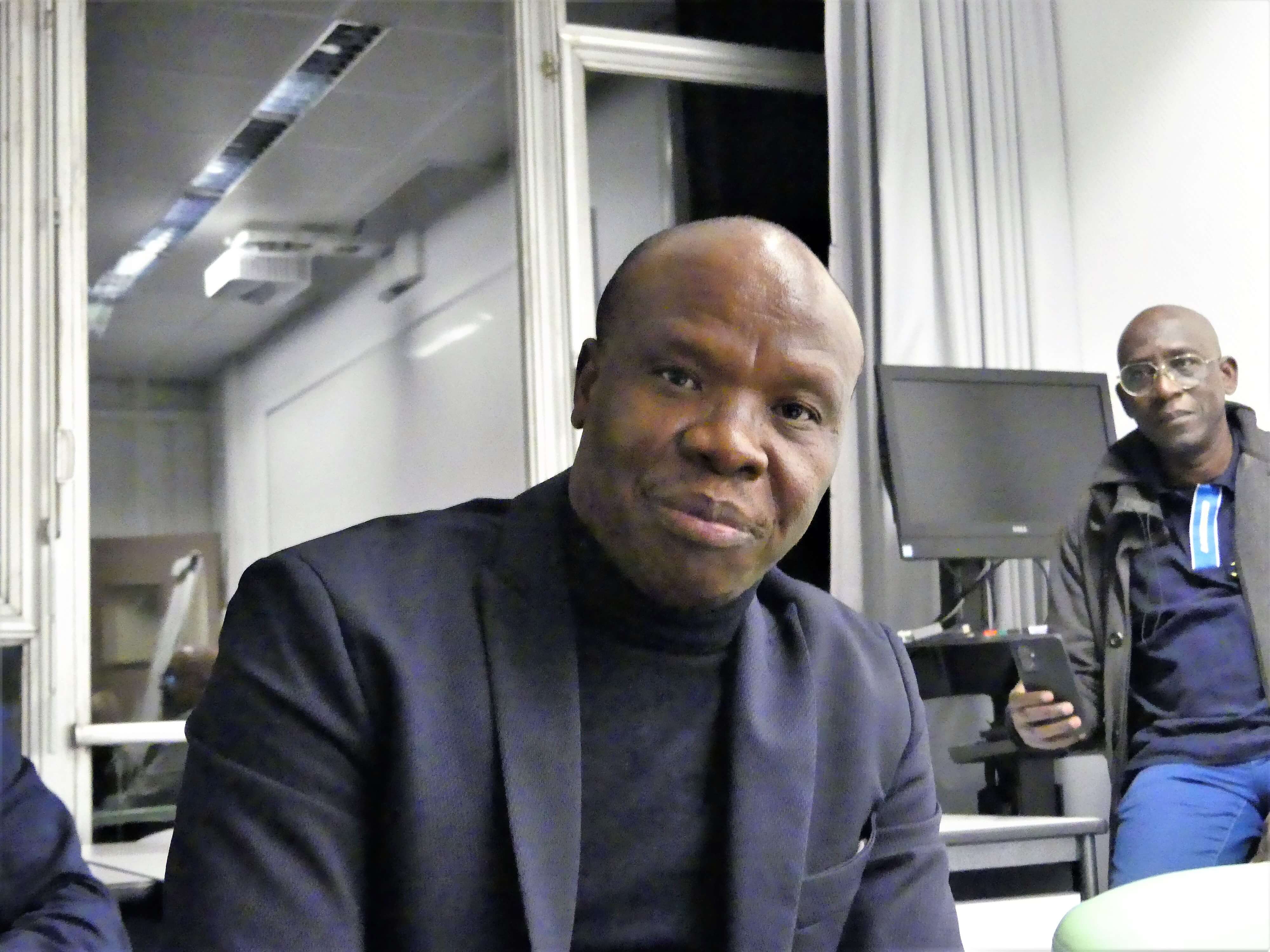Africa Days 7th Edition: Forging Culture into Africa’s Economic Locomotive
African cultures, arts and development. Such were the 2023 AfricaDays themes revisited by some of West Africa’s strongest advocates. The Côte d’Ivoire’s Minister of Culture, Françoise Remarck, an HEC alumnus, led the debate featuring current student A’Salfo – of Magic System fame, manga artist Michael Damby and Damby’s producer Julien Friant-Zeroug. The high-level debate was followed by over 120 spectators, both in-person and online.
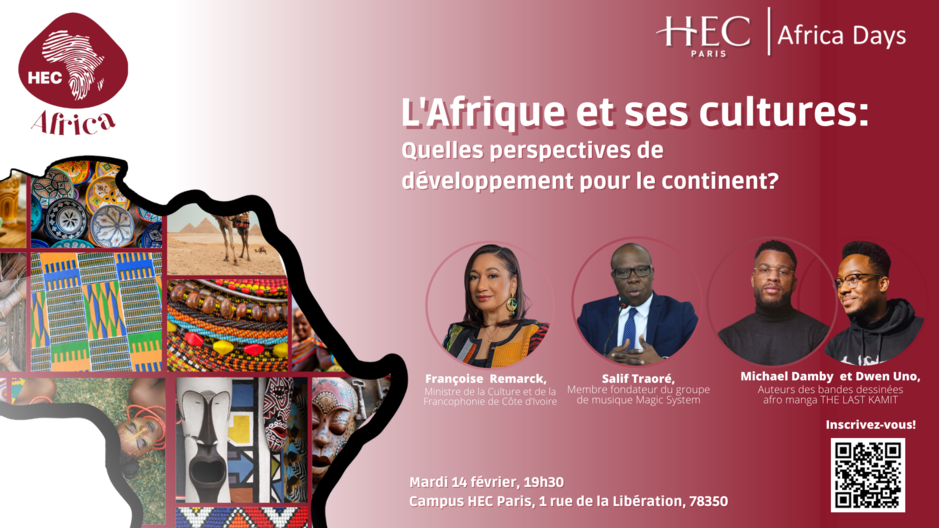
“Our cultures play a fundamental role in our societies. It’s through their manifestation that we discover our common values, they constitute the pillar of a free and enlightened citizen.” It was through these words that Minister Françoise Remarck (H04) sparked off an impassioned discussion on African cultures and their potential in developing the continent.
An engrossing evening in HEC’s T206 amphitheater, featured speakers who shared the cultural riches they have explored and enriched in their careers. The panelists also did not shy away from the common challenges they faced. Salif Traoré - better known as A’Salfo, singer and co-founder of Magic System - described with pride the key role music is playing to promote social cohesion in his native Côte d’Ivoire. But he also insisted on the essential role the governments need to play to buoy up the sector: “Our authorities need to install the infrastructures to develop culture. But they don’t! They see how it’s become a pillar of Africa’s economy but the Ministry of Culture remains forgotten in all our budgets. Contrast that with Nigeria. It’s become the most economically powerful state on the continent but its locomotive is its cultural and creative industries. Why? Because it knew when to invest.” Currently finishing an executive degree at HEC (see below), A’Salfo has invested heavily in social initiatives in the fields of peace, education and education in West Africa through his Magic System Foundation. “I’ve toured most of Africa, thinking we could learn from other countries,” said the artist who has been UNESCO Goodwill Ambassador for the past 11 years.“But, in the main, the Ministries of Culture remain ignored and poor. That’s why I’ve tried to set an example by setting up FEMUA (the Anoumabo Urban Music Festival, based in the Abidjan neighborhood of the same name, ed.). This annual event has been going for 15 years and aims at showing how you can combine the arts with strong social activities and be profitable commercially.”
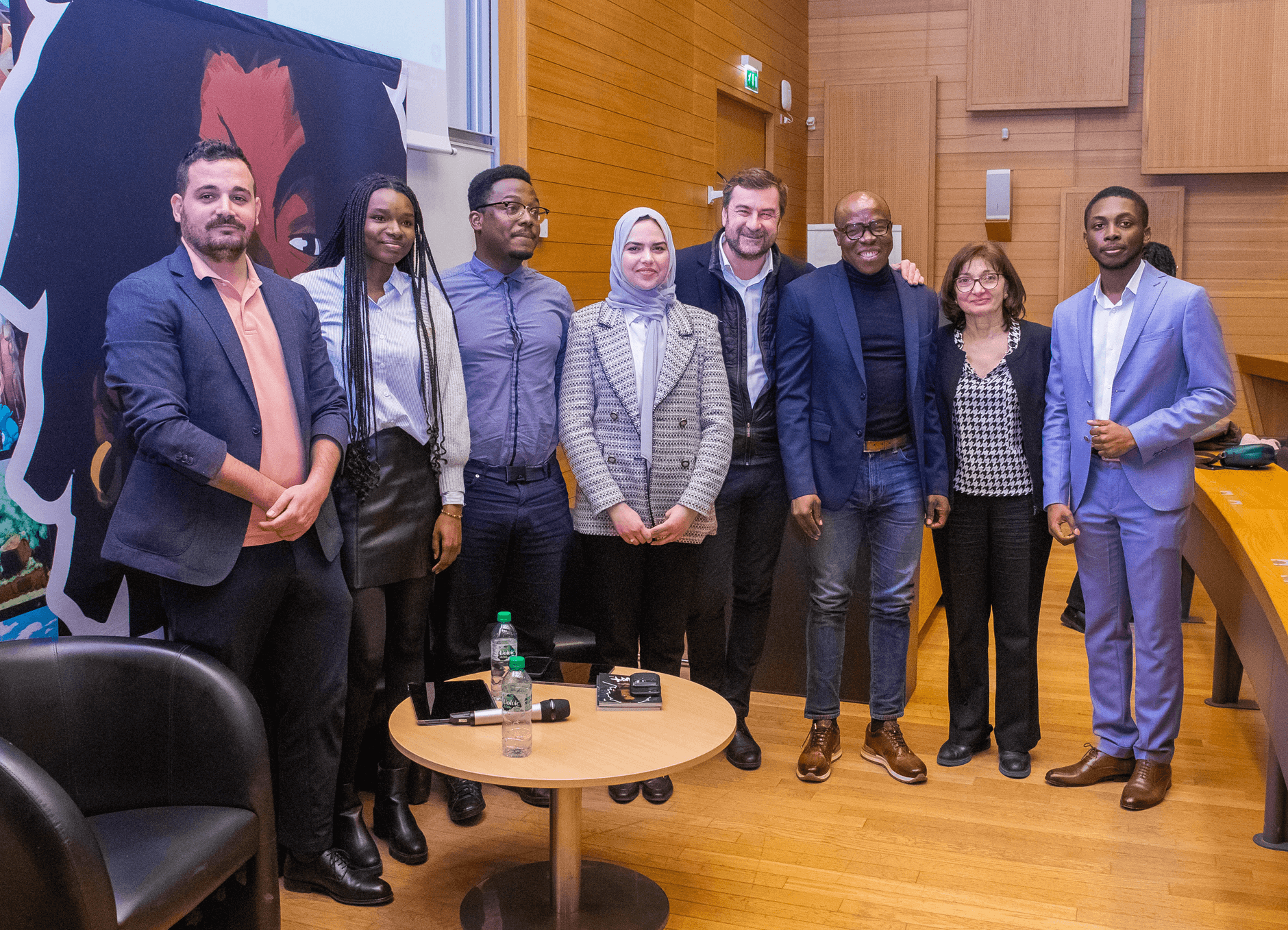
Panelists and student organizers © Tidiane Traore for the Magic System Foundation
Afro Mangas Explore Identity
Dwen Uno knows a thing or two on how to combine art with commercial success. He’s one half of a duo of Afro-descendant artists who have forged “Afromangas”, a combination of “African traditions, wasabi and ketchup”. Uno described the works he’s created with fellow Guadeloupian Mike Damby, two volumes called “The Last Kamit”. “We created two heroes, Emany and Sanka, based on true stories we’ve collected over the years. They travel through Africa and its diaspora in an initiation quest. The manga was a perfect vehicle to encourage Africans and Afro-descendants to find themselves.” The self-published project has been a phenomenal success, despite – or thanks to? - coming out in the middle of the COVID-19 pandemic, with sales topping 22,000 for the first volume alone.
“It’s been incredible, two years now that we’ve been touring our works with over 150 promotional events, topping the sales in this market,” said Julien Friant-Zeroug, the articulate producer who drew applause at every intervention he made in the course of the evening. “It’s probably because there’s a real demand for positive representation of Africa. We need to see different stories, encourage diversity, leave behind the cliché of the classic white hero. There are incredible Africans, African women, people on the continent with disabilities who can save the world. You just need to take the time to tell their stories and let them have the same space as everyone else.” The communicator of Algerian and Albanese-Russian origin has set up offices in Casablanca, Côte d’Ivoire, Paris and Brussels and doesn’t hide his global ambitions: “We have over a dozen projects penciled in for this year – manga comics, books for children, multimedia, digital works. Our artistic director is scouting for new talents, horizons are opening up. The sky is the limit!”
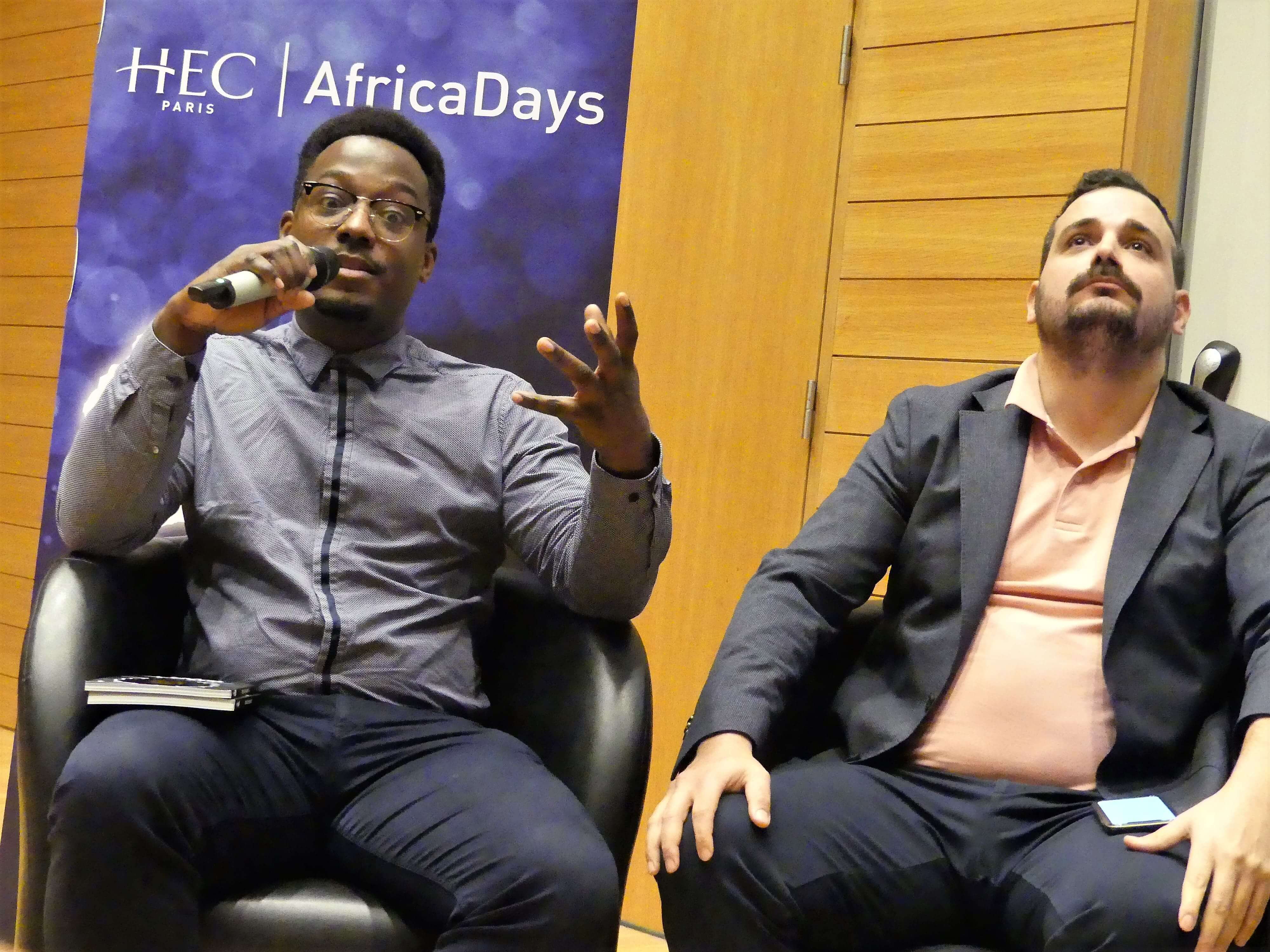
Dwen Uno making his points © Daniel Brown
Animated Debate
For HEC Senior Executive Director of International Affairs Philippe Oster, the Africa Days event is part of the school’s determination to further invest in Africa. “Conferences like these are part of our commitment to spotlighting the treasures this continent holds. We are well aware of the importance of culture in Africa and have organized major events in the past which aim at addressing key contemporary themes: these include leaders in women entrepreneurship, fintech, political leadership, women in diplomacy, Afropean fashion, music and green industries. These events complement our drive to train Africa’s most outstanding students in business and promote future careers geared towards the continent for all students, through the Africa Business Day, for example. . The interest for such kind of initiatives has grown significantly and evenings like this vindicate our desire to further showcase the continent's key issues, opportunities and challenges on campus.”
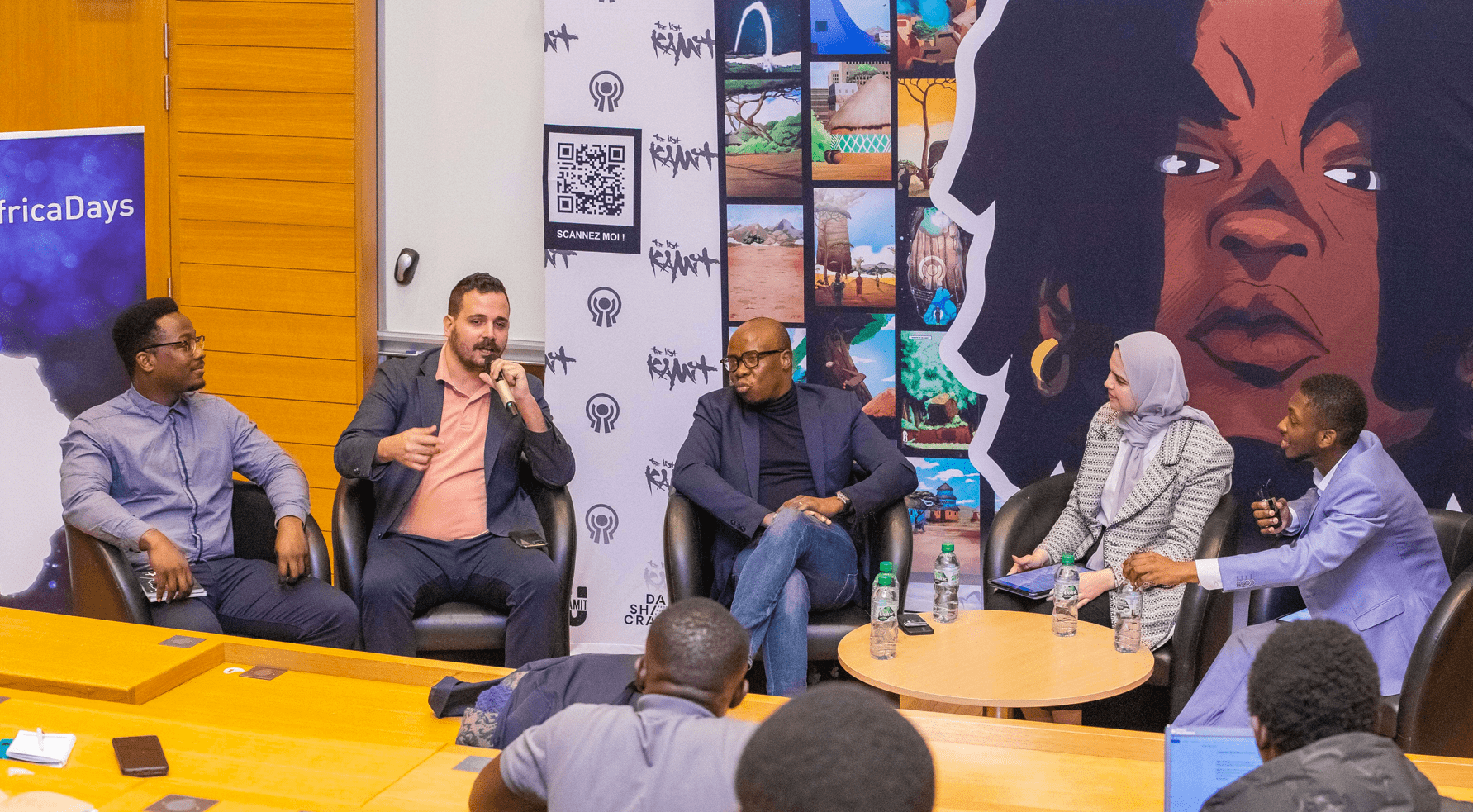
Debate opens up to the floor © Tidiane Traore for the Magic System Foundation
After the roundtable debate audience in auditorium T206 and on line participated in a lively Q&A session, exploring culture as a leverage for development in Africa. Ridai Yakoubou wondered if it were possible to preserve and promote the continent’s cultural traditions while, simultaneously, opening up to globalization and modern technology. Yao Pedomey in Lomé simply asked how his native Togo could overcome the lethargy in the country’s cultural sector and take off. Lucien Koffi Agbeko, also in Togo, asked A’Salfo if his FEMUA could export itself into other nations in its pursuit of social programs for the youth. Whilst Talha Bakharia in South Africa asked the Côte d’Ivoire Minister Françoise Remarck what her strategy will be to collect data on the cultural manifestations in her country.
The issue of reliable data was indeed a pre-occupation for the former Director General of Canal Overseas Africa: “The lack of data does slow down the understanding of what is at stake and the perspectives for development,” Remarck said. “This is why we are launching a sectorial study in conjunction with the AFD (LINK) to better define the strength of the sector.” Which, she concluded, is one of the reasons why budgets for the cultural sector in Africa represent under 3% of the continent’s GDP, while employing hundreds of thousands of peopl,. “The informal, artisanal aspect of our culture represents both the sector’s strength and its challenges. It’s up to us to better define and then calculate its impact.”
The three-hour event ended with a ringing call for the authorities to back the numerous initiative to make culture Africa’s first lever for development. In many ways, the four panelists mirrored the words of South African author Mitta Xinindlu:
"Beloved Africans,
you were once the victims of confusion in the past.
But you shouldn't remain in that disillusioned class.
Today you're free and enriched with resources to maintain yourselves.
Let the victim mentality go as a start.
Like the three wise men, embrace your survivor status.
Be wise and be resourceful.
Africans,
you have the permission to celebrate your roots,
your heritage, and the teachings of your books."
The next Africa Days event in May 2023 will focus on the question of water.
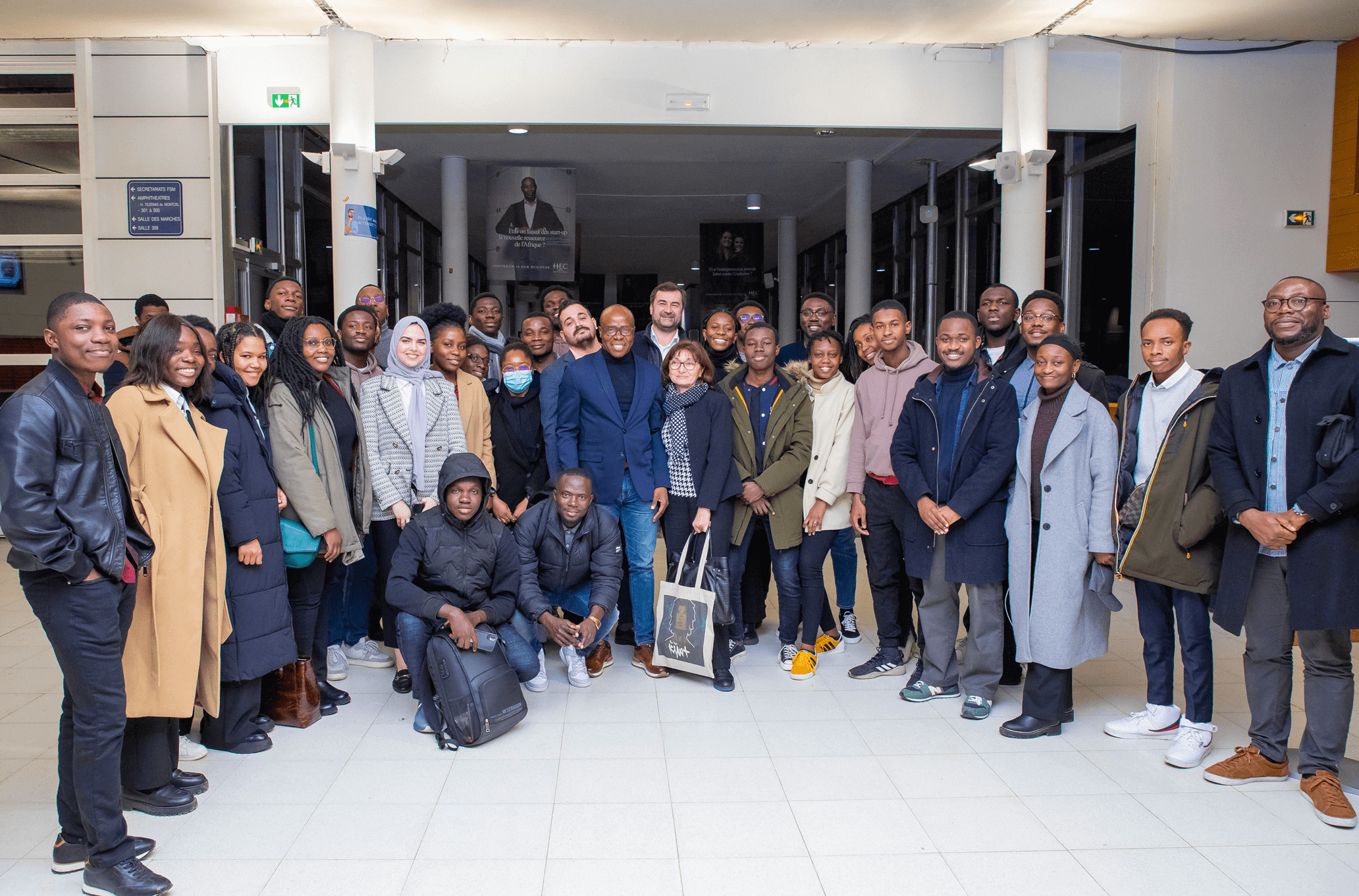
Panelists, organizers and members of the public after the event © Tidiane Traore for the Magic System Foundation
Three Questions for Salif Traore, a.k.a. A’SALFO
Salif Traore is not only the founding member of the Ivorian band Magic System and a Goodwill Ambassador for UNESCO since 2012. The singer-composer is also behind several business initiatives and has been running the urban music festival FEMUA since 2008. A’Salfo is currently studying at HEC Paris and is set to graduate in June 2023. We took advantage of his presence at the Africa Days edition N°7 to ask him three questions.
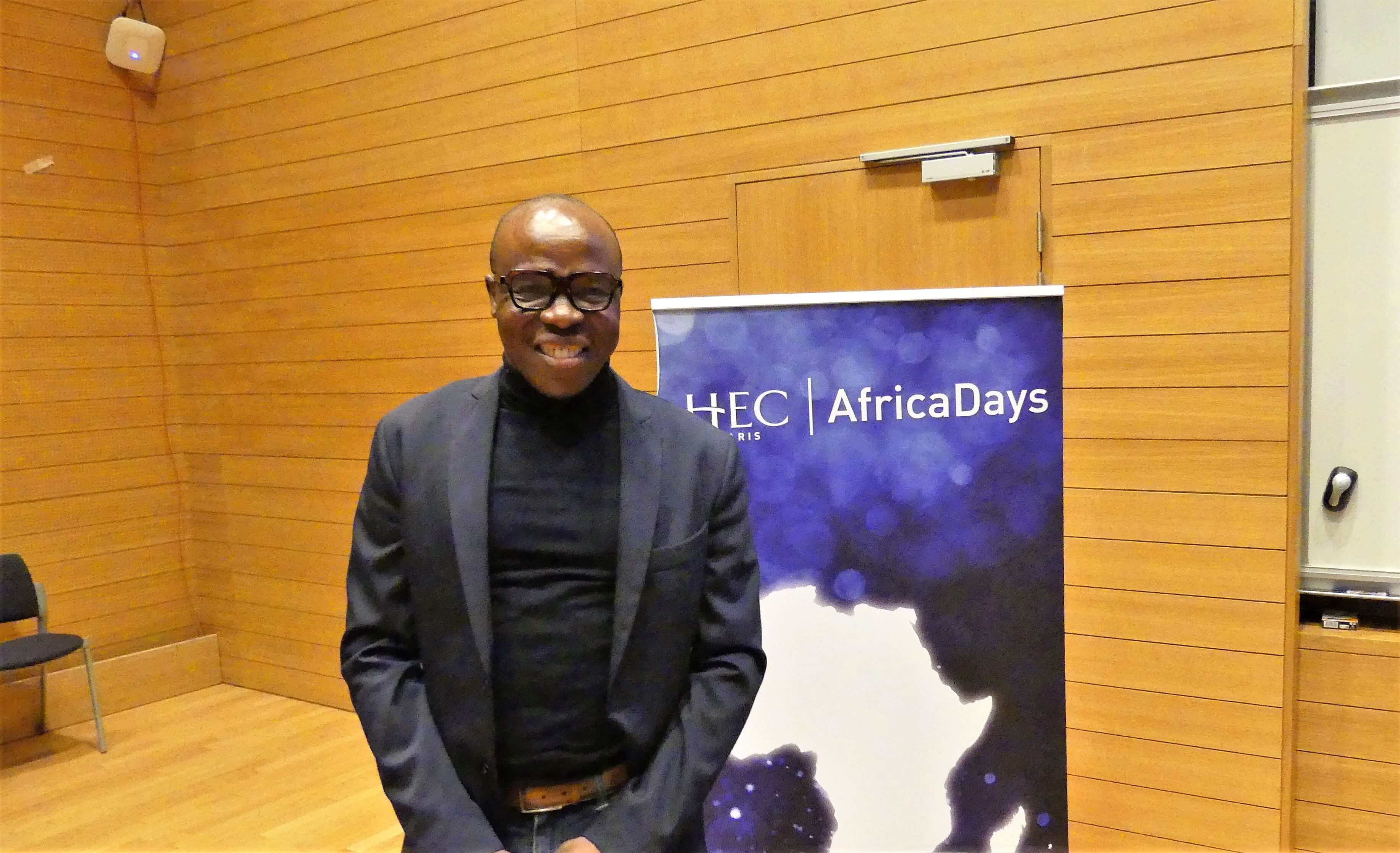
A’Salfo, your experience in business, including as Chair of the non-profit Magic System Foundation, seems to indicate that you’ve acaquired certain tricks of the trade. Why decide to come to HEC Paris to study a Global Executive Master in Management, GEMM?
I consider this experience as a trampoline in so many directions. This Master feeds into the way I conceive my projects and helps me to analyze the economic realities in my native Côte d’Ivoire. These days, African cultural entrepreneurship needs not only the continent’s artistic talents, we also are looking for a degree of know-how to retain and make these budding artists flourish. I can assure you HEC has given me plenty so far thanks to its intense form of immersion. It’s provided me the tools to better run my business unit, particularly in terms of understanding balance sheets and statements, the rudiments of accounting, strategy and finance. For example, I can now use the PESTLE analysis sheet, understand a strategy canvas and value curve, and so on. Just to let you all know, once I’ve obtained the GEMM Master in Management certificate, I’m aiming to embark on the Executive Certificate Lead Campus (CELC).
The challenges of piracy for the music and film industries in Africa has been well documented. What of the Internet and the digital era?
We need to adapt our structures to the demands of the Web and that’s a bit more complicated than you think. That’s because this sector demands a high level of bankability and a control of the banking sector, both of which continue to be fragile in African countries. Monetizing products on the Internet is not like buying a loaf of bread in the market place! So we have to find solutions to make digitalization profitable for the population at large. We’ve been able to integrate mobile currency in a way that is unprecedented, so why not use this to resolve some of these problems?
What about in the music sector?
I’m coming to that. Given the huge development of money transfers and purchases online, it should be easy to invent programs in order to sell our music efficiently over the Web. It’s ironic that we have to come here in France to promote and safeguard our music. We shouldn’t be forced to travel such distances. But if we’re not able to adapt to this music market it becomes complicated. And this is where we see the modern face of piracy, with illegal websites allowing you to download music without paying any royalties. There’s also a problem with major platforms like Youtube, Deezer and Spotify. The copyright organizations in Africa have not signed conventions with these companies, so they don’t pay royalties like they should. It’s actually one of the reasons I’ve come to HEC. I want to explore methods to resolve this issue. My thesis is centered on creating an automated system to recuperate copyrights from programs broadcast in public places (“La recuperation automatisée de programmes de diffusion de phonogramsmes des lieux accessibles au public, dans la repartition des droits d’auteur et droits voisins” is the official French title). This will hopefully allow copyright authorities in Africa to not only have reliable programs at hand to share copyright revenue equitably; it will also reveal the origins of works that unidentified composers on major streaming platforms like Youtube and others. In my thesis, I lay out the challenges and where the blockages are occurring. I’ll then make a series of recommendations which hopefully will lead to installing such programs. It should also help our African continent to evolve since digitalization can be a good thing for everyone, not just for those in the West.
